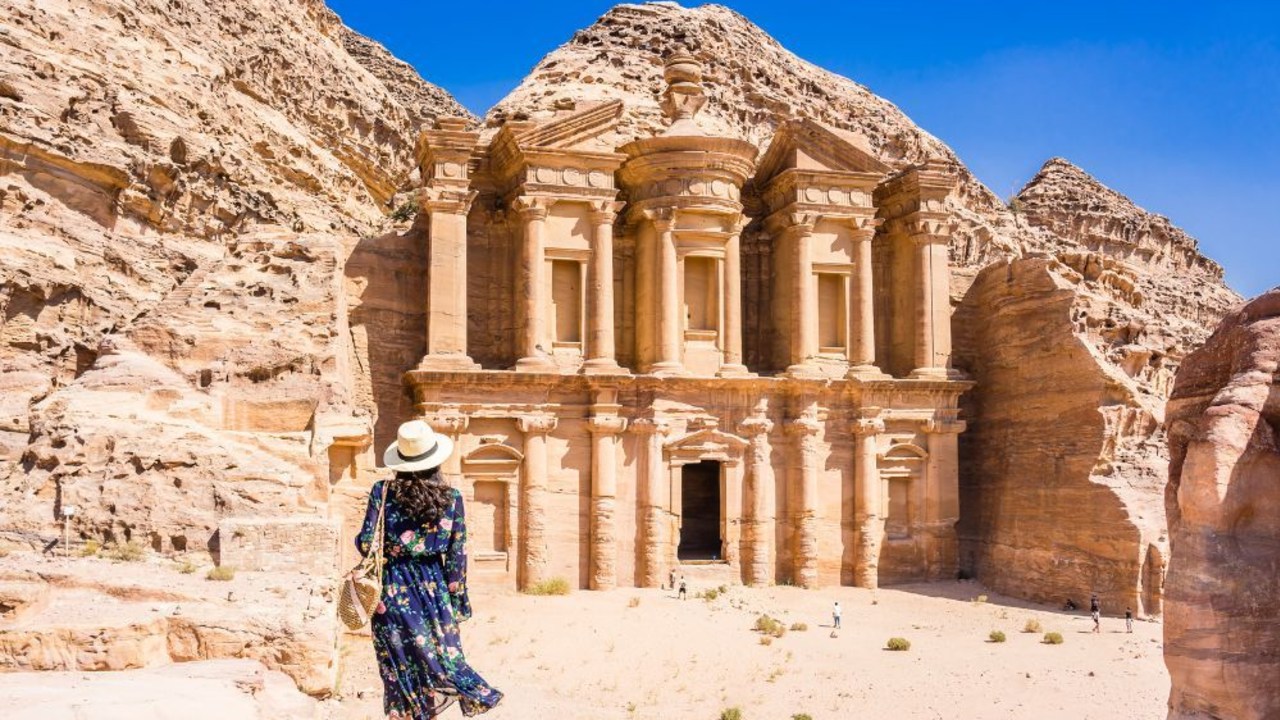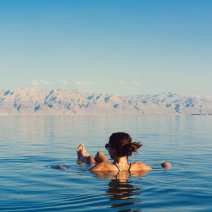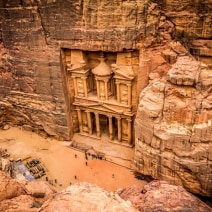Jordan Travel Guide
Jordan is a land of ancient wonders and striking contrasts. From the world-famous city of Petra with its tombs and temples carved into rose-coloured cliffs to the dramatic desert landscapes of Wadi Rum, every corner offers something unforgettable. You can take a thrilling jeep tour through Wadi Rum before spending the night under the stars in a Bedouin-style camp, hike through Jordan’s nature reserves to uncover rugged canyons and breathtaking scenery, or enjoy snorkelling in the Red Sea to see vibrant coral reefs up close. Float in the mineral-rich waters of the Dead Sea, wander through the Roman ruins of Jerash, or explore the lively capital Amman, where modern life meets deep history.
Home to around 11 million people, Jordan is known for its warm hospitality. Arabic is the official language, though English is widely spoken in the cities. With its mix of breathtaking nature, archaeological treasures and welcoming culture, Jordan is a destination full of adventure and discovery.
We’ve outlined some general information that may be helpful to you when planning your next holiday to Jordan.

Time Zone & Currency in Jordan
The currency is the Jordanian dinar. Jordan is two hours ahead of Greenwich Mean Time (GMT) throughout the year.

Weather in Jordan
Jordan’s climate is hot and dry, with long summers and short, cooler winters

Reading For Your Jordan Tour
Married to a Bedouin by Marguerite van Geldermalsen
Lawrence of Arabia by Jeremy Wilson
Leap of Faith: Memoirs of an Unexpected Life by Queen Noor

Best time to go to Jordan
Although Jordan can be visited year-round, our trips take place in April, June, September and October when the weather is warm, pleasant and ideal for exploring. Travelling in spring and autumn means excellent conditions for sightseeing and enjoying outdoor adventures.
Top activities and sights in Jordan

Top 10 activities to do in Jordan
From roaming the desert landscapes of Wadi Rum to exploring the lively streets of Amman, Jordan is a destination full of adventure. Discover the underwater world of the Red Sea in Aqaba with a snorkelling trip among colourful coral reefs, hike through dramatic canyons at the Mujib Biosphere Reserve, and step back in time among the ancient Roman ruins of Jerash.

Food and drink in Jordan
Jordanian cuisine is diverse and full of flavour, shaped by Bedouin roots, Levantine influences and Mediterranean traditions. Some must-try dishes include:
- Mansaf: The national dish of Jordan, featuring lamb cooked in a sauce of fermented dried yoghurt (jameed) and served with rice.
- Maqluba:A hearty combination of rice, vegetables and meat, served dramatically upside down after cooking.
- Falafel: Crispy, golden chickpea balls, often enjoyed with hummus, salad or freshly baked bread.
- Knafeh: A sweet favourite made with shredded pastry soaked in syrup and layered with cheese or cream.
- Shawarma: Marinated meat roasted on a vertical spit and served in flatbread with garlic sauce and pickles.
Food in Jordan is often enjoyed as mezze — a variety of small dishes shared with family and friends. Meals are accompanied by warm flatbreads, fragrant olive oil, herbs and spices such as sumac and za’atar. Traditional drinks include Bedouin tea infused with sage or mint, strong Arabic coffee with cardamom, and the refreshing Mint Lemon (Limonana). Alcohol is also available, particularly in international hotels, restaurants and tourist spots such as Amman.
Jordan Travel Guide FAQs
What should I know about Jordan’s history?
Jordan’s history stretches back thousands of years, with ancient civilisations such as the Nabataeans, Romans, Byzantines, and Umayyads leaving behind incredible monuments, cities, and trade routes. The most famous site is Petra, the Nabataean capital carved into rose-red cliffs around 300 B.C. Jordan also plays an important role in biblical history, with landmarks like Mount Nebo and the Jordan River. In more recent centuries, the land was part of the Ottoman Empire until the early 20th century. Following the First World War, the Emirate of Transjordan was created under British mandate, before gaining independence in 1946 as the Hashemite Kingdom of Jordan under King Abdullah I. Today, Jordan is known as a stable and welcoming nation, celebrated for its rich cultural heritage, warm hospitality, and position as a crossroads of history, making it a truly unforgettable place to explore.
Is it safe to travel to Jordan?
Jordan is widely regarded as one of the safest countries in the Middle East and is often referred to as the “Switzerland of the region” thanks to its peaceful reputation and good relations with neighbouring countries. The areas included on your itinerary are safe to visit, and our experienced guides will always be on hand to support you. As with travelling anywhere, it is sensible to remain aware of your surroundings. In larger cities there may be opportunists or pickpockets, so take care at busy tourist sites and keep your personal belongings secure. Use your hotel safe where possible, carry a photocopy of your passport when out exploring, and take extra care if using public transport.ourist sites and keep your personal belongings secure. Make use of your hotel safe, carry a photocopy of your passport when exploring, and exercise caution when using public transport.
Do I need a visa for Jordan?
If you are a citizen of the EU or the United Kingdom and hold an EU or British passport there are no other requirements for entry other than having valid passport for at least 6 months after your planned departure date. A visa will be issued upon arrival or can be obtained from the Honorary Consul of Jordan in Dublin.
Is the water in Jordan safe to drink?
Travellers should avoid drinking tap water in Jordan and instead use a reusable bottle filled with filtered or bottled water.
Is alcohol available in Jordan?
Although Jordan is predominantly a Muslim country, alcohol is not considered a social taboo. It can be found in many restaurants and hotels in larger cities, as well as in bars in tourist areas and in cities with significant Christian communities. Do keep in mind that alcohol is heavily taxed, and menu prices often exclude this levy.
What should I pack to wear in Jordan?
Out of respect for local customs and religious traditions, it is best to dress modestly, especially when visiting churches, mosques, or during city tours in Amman.
- Summer: Choose light, breathable clothing such as t-shirts and loose-fitting trousers. Shorts are fine in many tourist areas, though longer clothing is more suitable in conservative settings.
- Spring & Autumn: Pack a warm jacket or sweater for cooler evenings.
- Winter: Bring a thick, waterproof jacket as temperatures can drop and rain is more frequent.
Whatever the season, sun protection is essential. Sun cream, sunglasses, and a wide-brimmed hat are highly recommended. Comfortable walking shoes are also a must, as much of your time will be spent exploring on foot. Would you like
Jordan Travel Information
- For up-to-date information regarding entry into Jordan please see: www.dfa.ie
- Official Jordan Tourism Board: www.visitjordan.com









